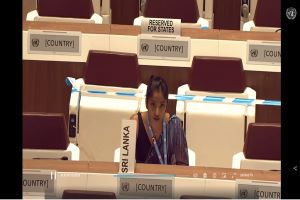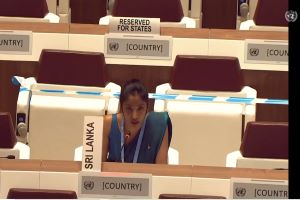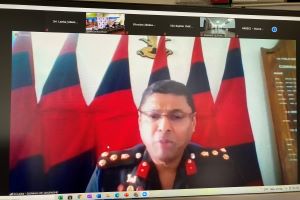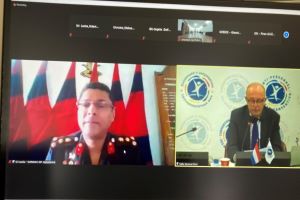
9 August, 2021
Mr. Chair,
We thank you for the draft elements paper on possible consensus recommendations circulated last Friday.
We have been engaged in discussions on technological, legal, military and ethical considerations of the development of autonomous weapon systems in this GGE forum since 2017. Over the years, a growing number of States have repeatedly flagged the alarming consequences of the challenges posed to fundamental IHL principles and humanity by the potential use of autonomous weapon systems and the urgent need for internationally agreed prohibitions and limitations.
During the discussion last Friday, some delegations re-iterated the need for our discussion to be based on the 11 guiding principles adopted in 2019, as reflected in the decision of the High Contracting Parties in 2019 , where it called upon the Group to consider the guiding principles, with a view to further develop and elaborate.

5 (a) An exploration of the potential challenges posed by emerging technologies in the area of lethal autonomous weapons systems to international humanitarian law
3 August, 2021
Mr. Chair,
Excellencies, Distinguished participants,
At the outset, Sri Lanka would like to congratulate you on your assumption of the Chair of the Group of Governmental Experts on LAWS and for the continuous engagement with states on this issue. Let me assure you Mr. Chair, of the full support and cooperation of my delegation as we approach the preparation of the recommendations of the GGE to the 6th Review Conference of the CCW.
Sri Lanka aligns itself with the position expressed in the Working Paper submitted by Venezuela on behalf of the Non-Aligned Movement (NAM) on possible consensus recommendations.
Since this session is dedicated to exploration of the potential challenges posed by LAWS to IHL, our remarks will be aimed at addressing this particular issue.
Madam President,
Sri Lanka believes that sports and international sporting events should serve as a platform to promote inclusiveness and cooperation among the community of nations. The importance of the Olympics as a significant global opportunity in this regard cannot be over-emphasised.
In 2018, Sri Lanka chaired the Social Forum of this Council which brought together many participants from around the world to discuss how sports and the Olympic ideal can contribute to the achievement of the 2030 Sustainable Development Agenda and human rights. We hope that the Council and all stakeholders will continue further action in this direction.
Madame President,
Sri Lanka takes note of the Special Rapporteur’s report on the Situation of human rights in the Palestinian Territories and wishes to express regret at the serious escalation in violence in the territory following evictions, demolitions, settlement expansion and settler violence. We deeply regret that the outbreak of violent hostilities in May caused wanton loss of many civilian lives. The long-term effects of such violence on infrastructure including water, sanitation and electricity will only lead to the suffering of the people of the Palestinian Territories.
We appreciate the work of the UN Relief and Works Agency (UNRWA) in responding to the humanitarian crisis in the Palestinian Territories and call on the international community to strengthen support for their activities. We also highlight the paramount importance of addressing the aggravated humanitarian situation in the Palestinian territories, including the provision of urgent healthcare including vaccines and therapeutics, and social and economic assistance to the populations affected by hostilities.
Sri Lanka re-iterates its consistent and principled position regarding the right of the Palestinian people to statehood and to the natural resources in their territory and re-iterates the importance of the early implementation of the relevant UNGA resolutions. We remain committed to supporting a negotiated settlement in line with the internationally agreed parameters of two states living side by side on the basis of the 1967 borders, which is key to achieving long term security, peace and prosperity.
I thank you


Madam President,
Sri Lanka notes the report presented by the Special Rapporteur on ‘means to address the human rights impact of pushbacks of migrants on land and at sea’.
In this context, we wish to draw this Council’s attention to the critical challenges faced by migrant workers, particualrly during the current pandemic situation.
The remittances of migrant workers who comprise 3.5% of the world’s population, contribute to the socio-economic development of communities and societies, lifting millions out of poverty, raising standards of living and providing access to health services, nutrition, education and housing. [According to the World Bank, remittance flows to low and middle income countries were US $ 540 in 2020, only 1.6% lower that the US$548 recorded in 2019.]
Madam President,
Sri Lanka notes the report presented by the Special Rapporteur on the right of everyone to the enjoyment of the highest attainable standards of physical and mental health.
The loss of lives and livelihoods and impediments to economic and social development due to the Covid-19 pandemic has exacerbated poverty, inequality and suffering, with serious consequences on the physical and mental health of billions around the world.
Recovery from this pandemic as well as prevention of a resurgence requires equitable access to diagnostics and therapeutics including vaccines, as well as adherence to other preventive measures. Despite early calls by the UN Secretary General and world leaders for international cooperation and solidarity in the response to the pandemic and for Covid-19 products to be considered global public goods, as we speak, millions of people from developing and least developed countries have been left behind due to unequal distribution of vaccines.
- 47th session of the Human Rights Council: Statement delivered by Sri Lanka at the Right of Reply segment of the Interactive Dialogue on the Annual Report of the United Nations High Commissioner for Human Rights
- Sri Lanka Statement at the Thematic Debate Session under Agenda Item 1 of the Conference on Disarmament on 12 May 2021
- Statement by Hon. Foreign Minister of Sri Lanka Agenda Item 2: Interactive Dialogue on the OHCHR Report ‘Promoting reconciliation, accountability and human rights in Sri Lanka’ (A/HRC/46/20) 24th February 2021
